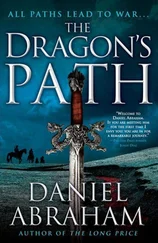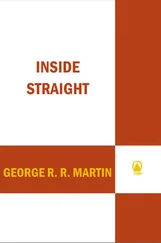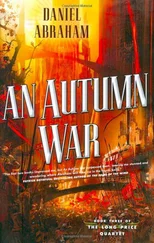Daniel Abraham - THE
Здесь есть возможность читать онлайн «Daniel Abraham - THE» весь текст электронной книги совершенно бесплатно (целиком полную версию без сокращений). В некоторых случаях можно слушать аудио, скачать через торрент в формате fb2 и присутствует краткое содержание. Жанр: Фэнтези, на английском языке. Описание произведения, (предисловие) а так же отзывы посетителей доступны на портале библиотеки ЛибКат.
- Название:THE
- Автор:
- Жанр:
- Год:неизвестен
- ISBN:нет данных
- Рейтинг книги:3 / 5. Голосов: 1
-
Избранное:Добавить в избранное
- Отзывы:
-
Ваша оценка:
- 60
- 1
- 2
- 3
- 4
- 5
THE: краткое содержание, описание и аннотация
Предлагаем к чтению аннотацию, описание, краткое содержание или предисловие (зависит от того, что написал сам автор книги «THE»). Если вы не нашли необходимую информацию о книге — напишите в комментариях, мы постараемся отыскать её.
THE — читать онлайн бесплатно полную книгу (весь текст) целиком
Ниже представлен текст книги, разбитый по страницам. Система сохранения места последней прочитанной страницы, позволяет с удобством читать онлайн бесплатно книгу «THE», без необходимости каждый раз заново искать на чём Вы остановились. Поставьте закладку, и сможете в любой момент перейти на страницу, на которой закончили чтение.
Интервал:
Закладка:
water, and for another, I will swear to you that more than one poet has
reached for Youth-Regained or some such."
"But how can I make that fit?" Eiah said. "What makes an old man's
failing hip different from a young girl's bruised one? The speed of the
injury?"
"The intention," Maati said, and touched a line of symbols. His finger
traced the strokes of ink, pausing from time to time. He could feel
Eiah's attention on him. "Here. Change ki to toyaki. Wounds are either
intentional or accident. Toyaki includes both senses."
"I don't see what difference it makes," Eiah said.
"Ki also includes a nuance of proper function. Behavior that isn't
misadventure or conscious intention, but a product of design," Maati
said. "If you remove that ..."
He licked his lips, his fingers closing in the air above the page. Once,
many years before, he had been asked to explain why the poets were
called poets. He remembered his answer vaguely. That the bindings were
the careful shaping of meaning and intention, that makers or
thought-weavers were just as apt. It had been a true answer for as far
as it went.
And also, sometimes, the grammar of a binding would say something
unexpected. Something half-known, or half-acknowledged. A profound
melancholy touched him.
"You see, Eiah-cha," he said, softly, "time is meant to pass. The world
is meant to change. When people fade and die, it isn't a deviation. It's
the way the world is made."
He tapped the symbol ki.
"And that," he said, "is where you make that distinction."
Eiah was silent for a moment, then drew a pen from her sleeve and a
small silver ink box. With a soft pressure, gentler than rain on leaves,
she added the strokes that remade the binding.
"You accept my argument, then?" Maati asked.
"I have to," Eiah said. "It's why we're here, isn't it? Sterile didn't
add anything to the world, it only broke the way humanity renews itself.
I've seen enough decline and death to recognize its proper place. I'm
not here to stop time or death. Just to put back the balance so that new
generations can come up fresh."
Maati nodded. When Eiah spoke, her voice sounded tired.
"I miss him," she said. He knew that she meant her father. "The last
time I saw him, he looked so old. I still picture him with dark hair. It
hasn't been like that in years, but it's what's in my mind."
"We're doing the right thing," Maati said. His voice was little more
than a whisper.
"I don't doubt it," Eiah said. "He's turned his back on a generation of
women as if their suffering were insignificant. Sexual indenture used to
be restricted to bed slaves, and he would make an industry of it if he
could. He would haul women across like bales of cotton. I hate
everything about the scheme, but I miss him."
"I do too," Maati said.
"You also hate him," she said. There was no place in this room for
half-truths.
"That too," Maati agreed.
Dinner that night was a brace of quail Large Kae had trapped. The flesh
was soft and rich. Maati sat at the head of the long table, Vanjit and
Clarity-of-Sight at the far end, and plucked the delicate bones. The
bright chattering voices of Small Kae and Irit seemed distant, the dry
wit of Ashti Beg grim. Eiah also seemed subdued, but it might only have
been that she was thinking of the binding. The meal seemed to last
forever, and yet he found himself surprised when Ashti Beg gathered up
the bowls and the talk shifted to cleanup chores.
"I don't think I can," Vanjit said, her voice apologetic. "I assumed
that we had changed the rotation."
"We skipped you last time, if that's what you mean," Ashti Beg said. "I
don't know if that's the same as agreeing to wait on you."
There was laughter in the older woman's voice, but it had teeth. Small
Kae was smiling a fixed smile and staring at the table. If he hadn't
been so distracted, Maati would have seen this coming before it arrived.
"I don't think I can, though," Vanjit said, still firmly in her seat.
The thing on her lap shifted its gaze from the poet to Ashti Beg and
back as if fascinated.
"I seem to recall my mother keeping the house even when she had a babe
on her hip," Ashti Beg said. "But she always was unusually talented."
"I have the andat. That's more work than washing dishes," Vanjit said.
"At court, poets are forgiven other duties, aren't they, Maati-kvo?"
"The smallest brat of the utkhaiem is forgiven their duties," Ashti Beg
said before Maati could frame a reply. "That's why it's court. Because
some people set themselves above others."
The air was suddenly heavy. Maati stood, unsure what he was about to
say. Irit's sudden chirp saved him.
"Oh, it isn't much. No need to fuss about it. I'll be happy to do the
thing. No, Vanjit-cha, don't get up. If you don't feel up to doing it,
you ought not strain yourself."
The last words rose at the end as if they were a question. Maati nodded
as if something had been decided, then walked out of the hall. Vanjit
followed without speaking, and took herself and her small burden down a
side hall and out to the gardens. Maati could hear the voices of the
others as they cleaned away the remnants of the small, fallen birds.
They met as they always did, sitting in a rough circle and discussing
the fine points of binding the andat. There was no sign of the earlier
conflict; Vanjit and Ashti Beg treated each other with their customary
kindness and respect. Eiah explained the difference between accident,
intention, and consequence of design to Irit and Small Kae and, Maati
thought, learned by the experience. By the warm, soft light of the
lanterns, they might have been talking of anything. By the end, there
was even real laughter.
It should have been a good evening, but as he went back toward his bed,
Maati was troubled and couldn't quite say why. It had to do with
Otah-kvo and Eiah, Vanjit and Clarity-of-Sight. The Galts and his own
unsettling if unsurprising insight into the nature of time and decay.
He opened his book, reading his own handwriting by the light of the
night candle. Even the quality of his script had changed since Vanjit
had sharpened his vision. The older entries had been ... not sloppy,
never that. But not so crisp as he was capable of now. It had been an
old man's handwriting. Now it was something different. He picked up his
pen, touched nib to ink, but found nothing coherent to say.
He wiped the pen clean and put the book aside. Somewhere far to the
south, Otah was dining with the men who had destroyed the Khaiem. He was
sleeping on a bed of silk and drinking wine from bowls of beaten gold,
while here in the dry plains his own daughter prepared to risk her life
to make right what he had done.
What they had done together. Otah, Cehmai, and Maati himself. One was
crawling into bed with the enemy, another turning away and hiding his
face. Only Maati had even tried to make things whole again. Vanjit's
success meant it had not been wasted effort. Eiah's fear reminded him
that it was not yet finished.
He made his way down the corridors in the near darkness. Only candles
and a half-moon lit his way. He was unsurprised to see Vanjit sitting
alone in the gardens. Unlike the courtyard where they had spoken before,
the gardens were bleak and bare. They had come too late to plant this
season. Eiah's occasional journeys to Pathai provided food enough, and
Читать дальшеИнтервал:
Закладка:
Похожие книги на «THE»
Представляем Вашему вниманию похожие книги на «THE» списком для выбора. Мы отобрали схожую по названию и смыслу литературу в надежде предоставить читателям больше вариантов отыскать новые, интересные, ещё непрочитанные произведения.
Обсуждение, отзывы о книге «THE» и просто собственные мнения читателей. Оставьте ваши комментарии, напишите, что Вы думаете о произведении, его смысле или главных героях. Укажите что конкретно понравилось, а что нет, и почему Вы так считаете.










